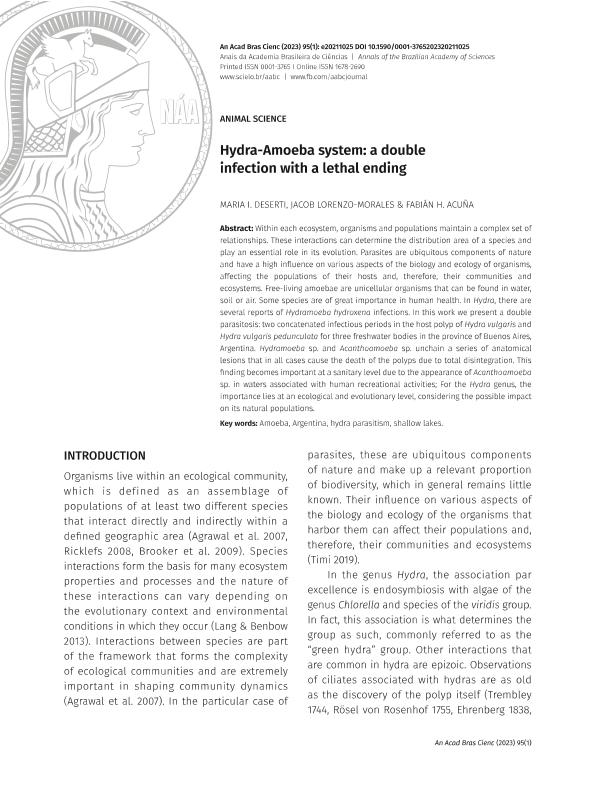Mostrar el registro sencillo del ítem
dc.contributor.author
Deserti, Maria Irene

dc.contributor.author
Lorenzo Morales, Jacob
dc.contributor.author
Acuña, Fabian Horacio

dc.date.available
2024-01-23T15:34:15Z
dc.date.issued
2023-05
dc.identifier.citation
Deserti, Maria Irene; Lorenzo Morales, Jacob; Acuña, Fabian Horacio; Hydra-Amoeba system: a double infection with a lethal ending; Academia Brasileira de Ciencias; Anais da Academia Brasileira de Ciencias; 95; 1; 5-2023; 1-14
dc.identifier.issn
0001-3765
dc.identifier.uri
http://hdl.handle.net/11336/224607
dc.description.abstract
Within each ecosystem, organisms and populations maintain a complex set of relationships. These interactions can determine the distribution area of a species and play an essential role in its evolution. Parasites are ubiquitous components of nature and have a high influence on various aspects of the biology and ecology of organisms, affecting the populations of their hosts and, therefore, their communities and ecosystems. Free-living amoebae are unicellular organisms that can be found in water, soil or air. Some species are of great importance in human health. In Hydra, there are several reports of Hydramoeba hydroxena infections. In this work we present a double parasitosis: two concatenated infectious periods in the host polyp of Hydra vulgaris and Hydra vulgaris pedunculata for three freshwater bodies in the province of Buenos Aires, Argentina. Hydramoeba sp. and Acanthoamoeba sp. unchain a series of anatomical lesions that in all cases cause the death of the polyps due to total disintegration. This finding becomes important at a sanitary level due to the appearance of Acanthoamoeba sp. in waters associated with human recreational activities; For the Hydra genus, the importance lies at an ecological and evolutionary level, considering the possible impact on its natural populations.
dc.format
application/pdf
dc.language.iso
eng
dc.publisher
Academia Brasileira de Ciencias

dc.rights
info:eu-repo/semantics/openAccess
dc.rights.uri
https://creativecommons.org/licenses/by/2.5/ar/
dc.subject
AMOEBA
dc.subject
ARGENTINA
dc.subject
HYDRA PARASITISM
dc.subject
SHALLOW LAKES
dc.subject.classification
Biología Marina, Limnología

dc.subject.classification
Ciencias Biológicas

dc.subject.classification
CIENCIAS NATURALES Y EXACTAS

dc.title
Hydra-Amoeba system: a double infection with a lethal ending
dc.type
info:eu-repo/semantics/article
dc.type
info:ar-repo/semantics/artículo
dc.type
info:eu-repo/semantics/publishedVersion
dc.date.updated
2023-12-22T15:39:14Z
dc.identifier.eissn
1678-2690
dc.journal.volume
95
dc.journal.number
1
dc.journal.pagination
1-14
dc.journal.pais
Brasil

dc.journal.ciudad
Rio de Janeiro
dc.description.fil
Fil: Deserti, Maria Irene. Consejo Nacional de Investigaciones Científicas y Técnicas. Centro Científico Tecnológico Conicet - Mar del Plata. Instituto de Investigaciones Marinas y Costeras. Universidad Nacional de Mar del Plata. Facultad de Ciencias Exactas y Naturales. Instituto de Investigaciones Marinas y Costeras; Argentina. Universidad Nacional de Mar del Plata. Facultad de Ciencias Exactas y Naturales. Departamento de Ciencias Marinas. Laboratorio de Biología de Cnidarios; Argentina
dc.description.fil
Fil: Lorenzo Morales, Jacob. Universidad de La Laguna; España. Centro de Investigación Biomédica En Red de Enfermedades Infecciosas; España
dc.description.fil
Fil: Acuña, Fabian Horacio. Consejo Nacional de Investigaciones Científicas y Técnicas. Centro Científico Tecnológico Conicet - Mar del Plata. Instituto de Investigaciones Marinas y Costeras. Universidad Nacional de Mar del Plata. Facultad de Ciencias Exactas y Naturales. Instituto de Investigaciones Marinas y Costeras; Argentina. Universidad Nacional de Mar del Plata. Facultad de Ciencias Exactas y Naturales. Departamento de Ciencias Marinas. Laboratorio de Biología de Cnidarios; Argentina. Estación Científica Coiba; Panamá
dc.journal.title
Anais da Academia Brasileira de Ciencias

dc.relation.alternativeid
info:eu-repo/semantics/altIdentifier/url/https://www.scielo.br/j/aabc/a/53RBswMYghJCKBVnvhxGw5b/?lang=en
dc.relation.alternativeid
info:eu-repo/semantics/altIdentifier/doi/https://doi.org/10.1590/0001-3765202320211025
Archivos asociados
